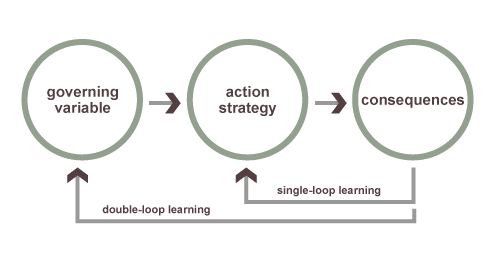double loop learning 双环学习
转载 2011-3-11
double loop learning
characteristics
author:Argyris, Chris and Schön, Donald Alan
country:United States
period:1978
type:theory
role:consultant and change agent
activity:analyse and reflect
topic:org. design & development, innovation & risk and change management
abstr. level:organisation
perspective:learning
description:
Psychologist Chris Argyris and philosopher Donald Schön's intervention research focused on exploring the ways organisations can increase their capacity for double-loop learning. They argued that double-loop learning is necessary if organisations and its members are to manage problems effectively that originate in rapidly changing and uncertain contexts.
Argyris and Schön distinguished three levels of learning in organisations.
1. SINGLE-LOOP learning
"Adaptive learning" focuses on incremental change. This type of learning solves problems but ignores the question of why the problem arose in the first place.
2. DOUBLE-LOOP learning
Generative learning focuses on transformational change that changes the status quo. Double loop learning uses feedback from past actions to question assumptions underlying current views. When considering feedback, managers and professionals need to ask not only the reasons for their current actions, but what to do next and even more importantly, why alternative actions are not to be implemented.
3. DEUTERO-learning
Learning how to learn better by seeking to improve both single- and double-loop learning.
People's tacit mental maps provide guidance on acting in situations: planning, implementing and reviewing their actions. Learning is based on the detection and correction of errors given a current set of norms, the applied action strategy and the realised outcome.
Argyris and Schön regarded individuals as the key to organisational learning. People constructing and sharing mental maps make the development of organisational memory and learning possible.
The theory-in-action concept of the two researchers substantiated that a gap exists between what individuals say they want to do (espoused theory) and what they actually do (theory in use). People always behave consistently with their mental models (theory-in-use) even though they often do not act in accordance with what they say (espoused theory). This concept is useful in understanding organisational behaviour and change processes.
Top management issuing orders, memos and directives alone is insufficient to change employees' behaviour. Single-loop learning often leads to organisational malaise resulting in symptoms such as defensiveness, cynicism, hopelessness, evasion, distancing, blaming, and rivalry.
In order to effectively come to grips with new situations, the espoused theories need to be aligned with the theories in use. Double-loop learning techniques help the organisation members learn together and the organisation change.

